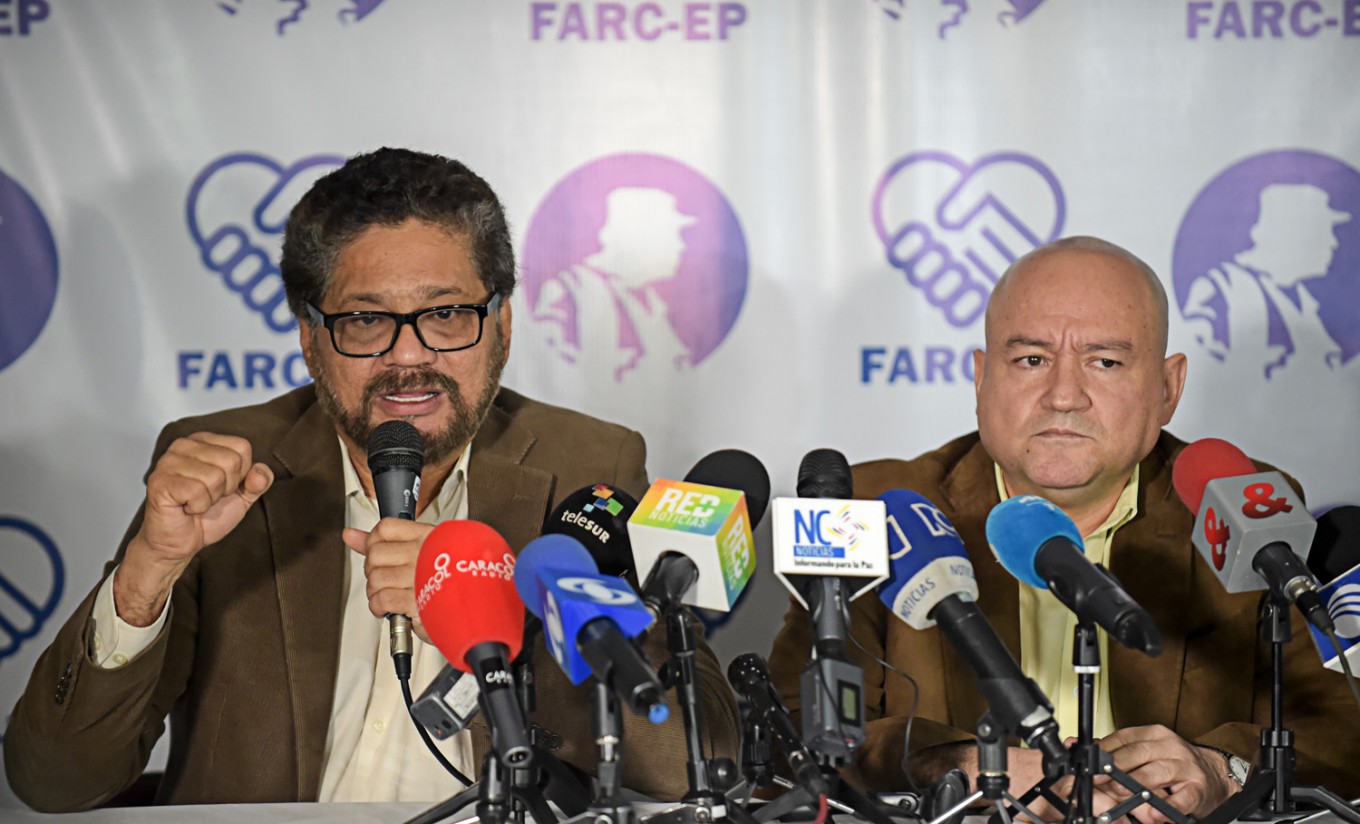Popular Reads
Top Results
Can't find what you're looking for?
View all search resultsPopular Reads
Top Results
Can't find what you're looking for?
View all search resultsColombia's FARC rebels to launch as political party on September 1
Change text size
Gift Premium Articles
to Anyone
 FARC commanders Ivan Marquez (left) and Carlos Lozada deliver a press conference announcing the launching of their political party in Bogota on July 24. The FARC guerrillas announced Monday they will launch a legal political party on September 1, after signing on November an agreement to overcome an armed conflict that lasted over half a century.
(AFP/Raul Arboleda)
FARC commanders Ivan Marquez (left) and Carlos Lozada deliver a press conference announcing the launching of their political party in Bogota on July 24. The FARC guerrillas announced Monday they will launch a legal political party on September 1, after signing on November an agreement to overcome an armed conflict that lasted over half a century.
(AFP/Raul Arboleda)
C
olombia's leftist FARC rebels said Monday they will officially transform into a political party on September 1, a major step in reintegrating into civilian life as part of a historic peace deal.
"The democratic opening that Colombia needs is approaching. We will launch our party on September 1," the FARC's top leader Rodrigo Londono wrote on Twitter, almost a month after the rebel group completed its disarmament.
The Revolutionary Armed Forces of Colombia, or FARC, is the largest and oldest rebel group in the country's long-running civil war.
Although a smaller rebel group, the ELN, has yet to put down its weapons, the transition of the FARC into a political party will put a stop to a 50-year conflict that left 260,000 people dead.
FARC commander Carlos Antonio Lozada, whose real name is Julian Gallo, said the group had been working on the details of the "great political-cultural act."
"We made peace to participate in politics," FARC chief negotiator Ivan Marquez added.
-- Ahead of pope's visit --
The FARC political party's policies and name will be decided at a congress at the end of August.
That meeting will take place just days before Pope Francis makes a special four-day visit to Colombia, from September 6-11, to add his weight to the process of reconciliation.
The disarmament last month by the roughly 7,000 members of Colombia's biggest rebel group under the 2016 peace accord brought a halt to the war.
Colombian President Juan Manuel Santos was awarded the Nobel Peace Prize for reaching the historic deal with the FARC that was signed last November.
The accord was narrowly rejected by Colombians in a referendum last year before it was redrafted and pushed through congress.
That rejection was due to in part to resentment by many ordinary Colombians that the FARC would be allowed to enter political life, after decades of killing and kidnapping.
The country's only remaining rebel group, the smaller National Liberation Army, or ELN, is currently following the path set by the FARC to negotiate a peace deal aiming to disarm and demobilize.
On Monday, the ELN and the government started a third round of talks in Ecuador aimed at reaching a similar peace deal as the FARC's.
"We will try to advance a ceasefire agreement," said government chief negotiator Juan Camilo Restrepo on Twitter.
Political analyst Victor de Currea said the process was making "very solid" progress and that both sides were hoping to declare a bilateral truce during the pope's visit.
-- FARC viewed negatively --
As well as leaving a quarter of a million dead, about 60,000 Colombians remain unaccounted for and seven million have been displaced in the conflict.
The FARC was born in May 1964 from a peasants' revolt, and its ranks were made up mostly of country-dwellers who rallied behind the group's Marxist-Leninist ideology, with land reform its key demand.
A former rebel, Erika Montero, said the new political incarnation of the FARC will be "anti-patriarchal" and "anti-imperialist."
The nascent party will especially focus on gender issues, the youth, and agricultural, urban and economic subjects, she said.
One option being considered is to keep the FARC acronym, but have it stand for different words.
It will be up to each former rebel to decide whether to participate in the party under their nom de guerre or their true identity.
Historically, the FARC had a bad image in Colombia because of the many kidnappings and deaths it was responsible for during the conflict.
Among the abductions was that of a former presidential candidate, Ingrid Betancourt, in 2002, who was held for six years.
According to a survey in May by the Gallup polling firm, 82 percent of Colombians have a negative opinion of the FARC.
-- Security guarantees --
Candidates for the future FARC party are to be given security guarantees to avoid a bloody repeat of political violence in the 1980s and 1990s directed at the leftwing Patriotic Union, which emerged from a previous peace initiative. Some 3,000 members of that party were killed.
Marc Chernick, a political science professor at Georgetown University in Washington and Los Andes University in Bogota, said "the FARC's political party could be a step towards an opening up of Colombia's political system."
He said the new party would not "necessarily be Marxist" and could face the challenge of being one of several parties on the left in Colombia. "They are going to seek alliances," he predicted.
As an early phase, the government is to allocate at least five seats in the 166-member House of Representatives and five in the 102-seat Senate to the movement. The former guerrillas may expand on that in elections due next year. (**)









